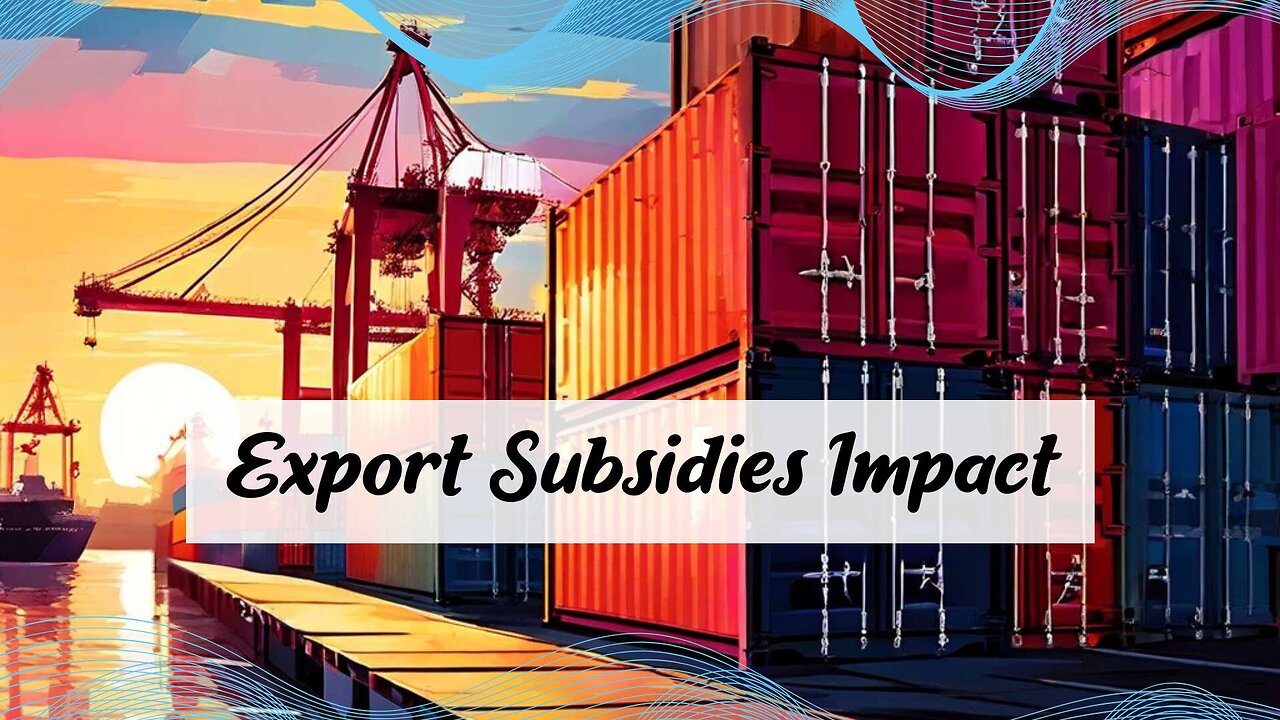Premium Only Content

Unraveling the Impact of Export Subsidies on International Trade
ISF Solution | (832-904-9333)
clearance@isfsolution.com | www.isfsolution.com
Export subsidies are financial assistance provided by governments to domestic industries to enhance their competitiveness in the global marketplace. They can take the form of direct payments, tax breaks, or subsidized loans. While export subsidies can have a positive impact by reducing production costs and increasing a country's export performance, they can also distort global trade patterns and create market imbalances.
One negative consequence of export subsidies is the potential for trade disputes and protectionist measures. When a country subsidizes its exports and floods international markets with goods at artificially low prices, it creates an uneven playing field for other countries and industries. This can lead to retaliatory actions, tariffs, and barriers to trade. Ultimately, it can damage the integrity of the global trading system.
Another concern is the long-term impact on domestic industries. While subsidies may initially boost competitiveness, they can create a dependency on government support and hinder innovation and efficiency. This can hinder the long-term growth and competitiveness of the industry.
To address these concerns, organizations like the World Trade Organization (WTO) play a crucial role in regulating and disciplining trade-distorting subsidies. Through negotiations and dispute settlement mechanisms, countries work together to establish rules and agreements that promote fair competition and prevent excessive use of export subsidies.
Understanding the complexities of export subsidies is important for businesses engaged in international trade. It can help them navigate potential challenges and opportunities, and ensure they can compete fairly in the global marketplace.
In conclusion, export subsidies have both positive and negative impacts on international trade. While they can boost a country's export performance, they can also distort trade patterns and create market imbalances. Striking a balance between supporting domestic industries and maintaining a fair global trading system is a key challenge for policymakers and trade organizations.
#usimportbond #isfcustomsbroker #uscustomsclearing #isfentry
Video Disclaimer Here: For educational purposes - No affiliation with US government sectors.
0:18 Export subsidies are financial assistance provided by governments to domestic industries to enhance their competitiveness in international trade.
0:46 These subsidies can come in various forms like direct payments, tax breaks, or subsidized loans to lower production costs and boost export competitiveness.
1:13 However, export subsidies can also distort global trade patterns by flooding international markets with goods at artificially low prices, creating an uneven playing field.
-
 1:00:46
1:00:46
The StoneZONE with Roger Stone
2 hours agoFake News Attack on Tulsi Gabbard! | The StoneZONE w/ Roger Stone
12.9K8 -
 2:24:08
2:24:08
WeAreChange
5 hours agoElon Musk & Donald Trump: The Emergency Halt That Saved Us
51.2K36 -
 DVR
DVR
Flyover Conservatives
21 hours agoWARNING! Is Bitcoin CIA-Controlled? – The Shocking Reality of Digital Assets - Clay Clark | FOC Show
12.8K3 -

Space Ice
8 hours agoSpace Ice & Redeye Try To Figure Out Seagal's Most Incoherent Movie
33.5K -
 1:00:36
1:00:36
PMG
22 hours ago $0.24 earned"Santa Trump is Giving Us Hope - But Will Johnson Stand Strong?"
46.1K9 -
 54:30
54:30
LFA TV
1 day agoThe German Strongman’s Arrival Is Imminent | Trumpet Daily 12.18.24 7PM EST
40K2 -
 2:04:11
2:04:11
Melonie Mac
6 hours agoGo Boom Live Ep 32! Soul Reaver Remastered!
33.2K8 -
 39:11
39:11
Sarah Westall
3 hours agoDigital Slavery and Playing with Fire: Money, Banking, and the Federal Reserve w/ Tom DiLorenzo
43.9K1 -
 1:38:38
1:38:38
2 MIKES LIVE
8 hours ago2 MIKES LIVE #157 ILLEGALS, PROTESTORS AND DRONES!
29.2K1 -
 1:01:03
1:01:03
LFA TV
1 day agoTHE LATEST SPENDING BILL IS AN ABOMINATION! | UNGOVERNED 12.18.24 5pm EST
33K35